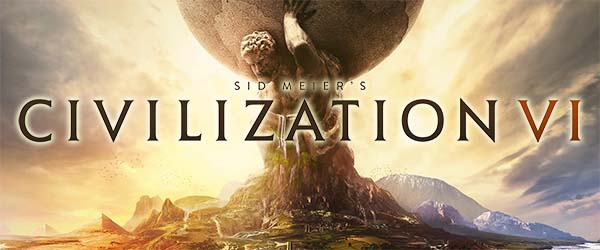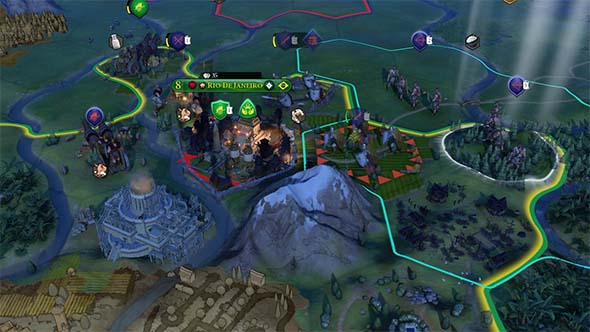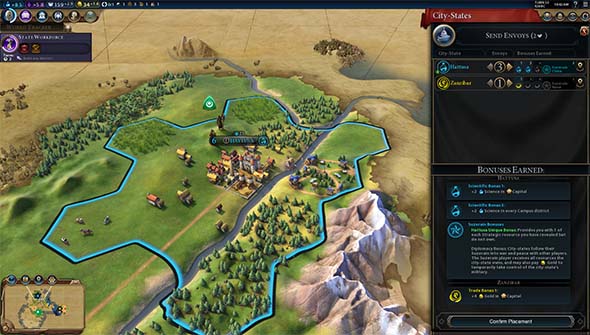
Firaxis has given me a belated birthday gift by releasing Civilization VI. They've also ensured that I don't get very much productive done during the months of October and November this year, since I've been sinking a whole lot of time into "one more turn"-ing myself late into the night. I've barely scratched the surface of the newly-released Dark Souls III DLC, my Madden franchise has fallen behind, and I haven't even bothered buying recently-released games like the new Master of Orion. My board game collection has been collecting dust, and my Dungeons & Dragons campaigns have been on hiatus. I'll get back to all those things after one more turn.
Oozing with production quality
The first thing that stood out to me upon entering my first game was the artwork. It's a pretty stark contrast from Civilization V's visuals. Civ V favored a semi-photo realistic quality. Many screenshots of the game's map look like satellite photos, and units (though exceedingly large) looked and animated realistically. This created a lot of pretty screenshots (still images), but the game looked kind of static, washed-out, and dull in motion. VI, on the other hand, goes for an exaggerated, vibrant, and more cartoonish look that reminds me a lot more of Civ IV and Civ Revolution.

The graphics are vibrant and highly informative. Everything that you see on screen genuinely means something.
What I really like is how utilitarian the visuals are. Almost everything on the game map is communicating part of the state of the game to the player. You can see every piece of infrastructure in and around a city, as well as exactly which tiles are being worked, all without having to open a separate screen and without having to clutter the screen with extra UI icons. There's even different graphics to represent the different phases of a building or wonder's construction that tells you exactly what that city is currently constructing, and how close it might be to finishing that wonder. It's attractive, but it's also clean and informative.
The fog of war is also wonderfully functional and neat to look at. This game renders the fog of war with the style of a hand-drawn map on canvas (similar to Total War: Shogun 2, which I loved). Heck, there's even an animated day/night cycle that was seemingly added because ... why not?
Improvements have different graphics for when they're un-worked [LEFT] versus worked [RIGHT].
The rest of the game shows similarly high production quality. There's actual cinematics for the win screens instead of dialogue boxes with a static image. Finishing a wonder results in an in-game cutscene of that wonder's construction. It isn't quite as pretty as Civ IV's pre-rendered wonder movies, but makes up for it by providing a sense of context that makes me feel like I'm seeing "my Oracle" instead of just the Oracle. There's more historic quotes, all of which are narrated wonderfully by Sean Bean. Firaxis even brought back composer Christopher Tin for some of the music. The new theme music, "Sogno Di Volare" ["The Dream of Flight"] isn't as immediately catchy as "Baba Yetu", but it's still an uplifting, memorable track that stands out more than the menu themes of Civ V. Put simply, this game just looks and sounds terrific...
[More]
b970ea1d-5fb2-48fe-9374-28eaf71e348a|2|5.0
Tags:Sid Meier's Civilization, Civilization VI, civilization, strategy, grand strategy, turn-based strategy, history, humanism, humanist, Civilopedia, city, empire-building, districts, hex, civic, social policy, diplomacy, Ed Beach, Christopher Tin, Sean Bean

I had another opportunity over the weekend of June 11th to participate as a guest host on the Civilization podcast PolyCast for their 257th episode. I joined regular hosts DanQ, TheMeInTeam, MadDjinn, and Makahlua as we discussed the latest news regarding Civilization - specifically, some new information regarding City States in Civilization VI. We discussed how the new envoy system works, what exactly Firaxis might mean by city states being "streamlined", took a jab at Beyond Earth by joking that stations are "streamlined" city states, and then teased Dan with the apparent lack of a "bully" option on the city state interface that is shown in the screenshots.

City State "diplomacy" is now handled by sending envoys rather than by buying their alliances with gold.
The new city state system relies on sending diplomatic envoys to a city state. Once certain thresholds of envoys have been reached, the city state grants certain bonuses based on its type. The civ with the most envoys gets the privilege of being the suzerain of the city state (seems to be just a renaming of "ally" or "master"), which confers a unique bonus to the civ from that city state. Having unique bonuses from city states is a cool new feature that adds more variety and personality, and helps inform the player of the history of that city states in the same way that the civilizations' national powers were informed by some aspect of the respective civ's culture and history. Very nice addition.
The envoy system seems to be an attempt to make city states feel more diplomatic and less like bribery subjects. It sounds like it should work towards that goal, and city states alliances will require more long-term commitment and hopefully won't be subject to the same kinds of mass-gold buying to suddenly swing their alliances from one civ to another. I just wonder if city states will still play a major part in the diplomatic victory?...
[More]
de2d4ae3-198c-4487-af6e-079600f8db29|0|.0
Tags:Civilization, Sid Meier's Civilization, Civilization V, Civilization VI, PolyCast, Firaxis, podcast, DanQ, Makahlua, TheMeInTeam, MadDjinn, city state, envoy, civic, social policy, Ed Beach, E3